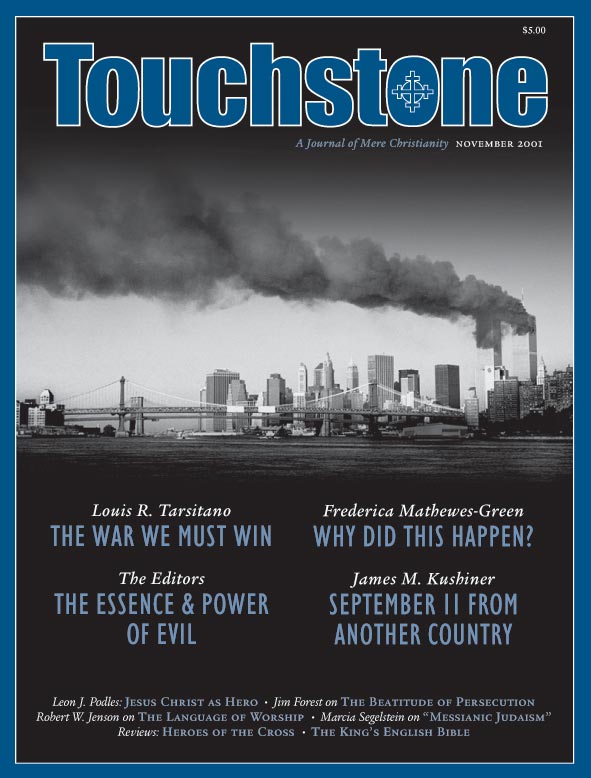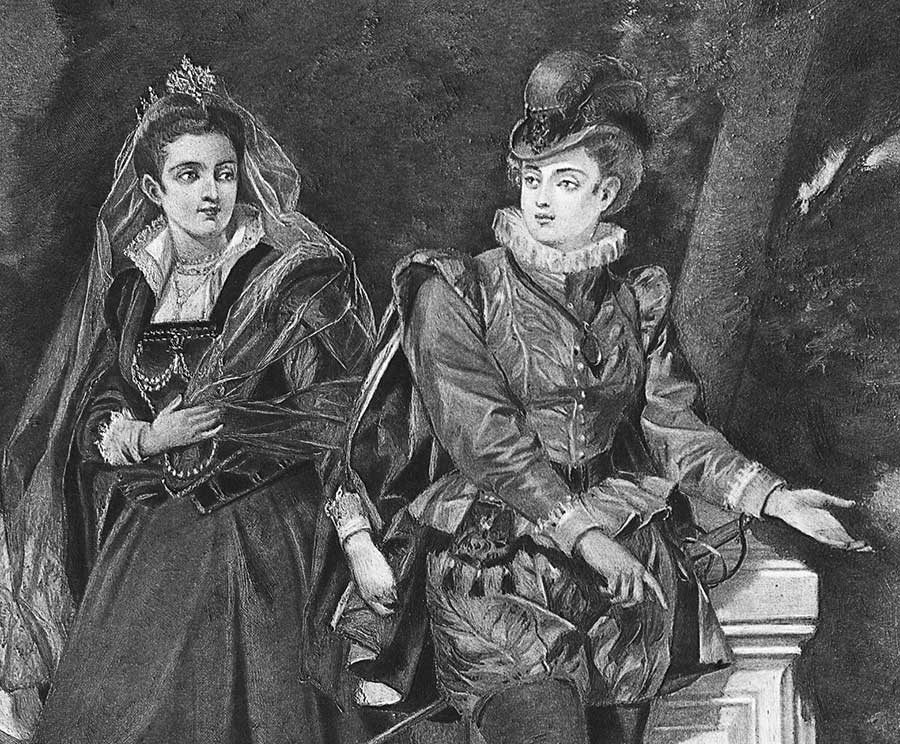Caught Between Root & Branch
“Messianic Judaism”—Can There Be a Middle Ground?
by Marcia Segelstein
According to some, nothing less than the Holy Spirit is at work in a recent movement of Jews who have become Christian but wish to remain “fully Jewish.” According to others, it is nothing more than a thinly veiled attempt by Evangelical Christians to convert Jews to Christianity.
Messianic Jews, as they call themselves, believe in Jesus, preferring to call him Yeshua. They worship in traditional Jewish ways and bristle at the term “conversion.” Most Messianic Jews eschew the term “Christian” because it has become synonymous with the term “gentile.”
Unlike Jews for Jesus, which set out to convert Jews to Christianity and, for the most part, assimilate them into gentile churches, Messianic Jews feel strongly about not giving up their Jewish lifestyle and style of worship—and aren’t afraid to say so. One group, the Chosen People Ministries, ran a full-page ad in the New York Times showing a photo of 15 people above a caption that reads: “Is it reasonable to be Jewish and believe in Jesus? We think so!”
Their critics disagree. According to Mark Powers, National Director of Jews for Judaism, “Someone born of a Jewish mother may be Jewish to begin with, but if they opt out of the Jewish faith system, they opt out. These people have opted out. . . . You cannot be both Jewish and Christian at the same time. It’s a contradiction in terms.” To Powers and other Jewish critics, Messianic Judaism is just one more attempt to convert Jews to Christianity. For them, telling Jews they can remain Jews, retain all of their Jewish traditions and practices, and at the same time believe in Yeshua is intrinsically deceptive.
Ancient Separation
Unlike the vast majority of mainstream Jews and Christians, Messianic Jews believe there is no contradiction here. They point to Jewish Christians of the first century as role models. Up until the destruction of the Temple by the Romans in A.D. 70, the Jewish Christians had continued to participate in Temple worship.
Following the fall of Jerusalem in A.D. 70, the only Jewish sect left standing, besides the Jewish Christians, was the Pharisees. Under the leadership of Rabbi Yohanan Ben Zakkai, they adapted Judaism for life without the Temple. Pharisaic Judaism eventually became Rabbinic Judaism, and the basis for modern Orthodox Judaism. One of the tenets of this new Judaism was that it would not include believers in Jesus. References to Yeshua in the Talmud, compiled in the fifth and sixth centuries, are all hostile.
At the same time, the Church was becoming more gentile and further removed from its Jewish roots. The Council of Nicaea in 325, called by Constantine, clearly distanced the Church from Jewish practice. Constantine wrote in a letter to those not present at the council: “We ought not, therefore, to have anything in common with the Jews . . . and . . . we desire, dearest brethren, to separate ourselves from the detestable company of the Jews.”1
In 787 the Second Council of Nicaea stipulated in its Eighth Canon that “Hebrews ought not to be received unless they have been converted in sincerity of heart.” It reads,
Since certain, erring in the superstitions of the Hebrews, have thought to mock at Christ our God, and feigning to be converted to the religion of Christ do deny him, and in private and secretly keep the Sabbath and observe other Jewish customs, we decree that such persons be not received to communion, nor to prayers, nor into the Church. . . . But if any of them, out of a sincere heart and in faith, is converted and makes profession with his whole heart, setting at naught their customs and observances, and so that others may be convinced and converted, such an one is to be received and baptized, and his children likewise; and let them be taught to take care to hold aloof from the ordinances of the Hebrews.2
This ban on Jewish practices didn’t stop all Jews from believing in Jesus Christ as their Messiah, but it left them little choice except assimilation into the gentile Church.
Modern Revival
Given the early demise of Jewish Christianity and the long history of exclusion between Jews and Christians, what accounts for the 350 congregations of Messianic Jews around the world? Rabbi Joel Chernoff, President of the International Messianic Jewish Alliance, believes that beginning in 1967 God “poured out his Spirit upon the Jewish people,” triggering a Messianic Jewish revival. He doesn’t believe it was mere coincidence that 1967 also marked the return of all of Jerusalem to Jewish hands, following the Six Day War.
But what Chernoff sees as the Holy Spirit at work, Rabbi Charles Simon, executive director of the Federation of Jewish Men’s Clubs, sees as a “deliberate attempt to convert Jews by approximating Jewish practice. It’s a well thought out plan that began fifteen or twenty years ago . . . when Evangelicals developed a technique [whereby] they would set up synagogues, or places that look like synagogues, to bring Jews to Christ. . . . It is heavily funded by Southern Baptists, the Lutheran Missouri Synod and Campus Crusade for Christ.”
Messianic Jews, however, say the movement had much more humble origins and began with individuals who essentially had the same idea at the same time. As young Jewish converts to Christianity, Russell Resnik, Joel Chernoff, and Daniel Juster were just three among many who would be moved, separately, over time, to hold onto their Jewish roots. Now all Messianic Jewish rabbis, they eventually ended up helping to found the movement.
Resnik and his wife Jane, for example, were sixties radicals who had come to believe in Jesus. But this belief only served to heighten their interest in their once-rejected Jewish roots. They spent years struggling with, on the one hand, Jews who considered them traitors for believing in Jesus, and on the other, Christians who expected them to abandon their Jewish practices altogether.
Christian Questions
For many Christians, Messianic Judaism raises obvious questions about such matters as the sacraments, belief in the Trinity, apostolic succession, and observance of the Sabbath on Saturday. Rabbi Russell Resnik, speaking at least on behalf of members of the United Messianic Jewish Congregations, explains: “The UMJC statement of faith, to which all member congregations subscribe, includes this: ‘We believe that there is one G-d, eternally existent in three persons, Father, Son and Holy Spirit.’” In terms of sacraments, both baptism (mikvah or tavilah) and Communion (Lord’s Seder or Yizkor Ha-Mashiach) are observed. He is unaware of a parallel claim to an apostolic succession such as that claimed by the historic churches. Insofar as Messianic Jews continue to observe the Sabbath on Saturday, Resnik explains that Exodus 31:16–17 “describes the seventh day Shabbat as a covenant sign for Israel. This is not changed by the fact of the resurrection on the first day of the week. We have no argument with Sunday worship for the Church, but feel that as a form of Judaism we are to retain Shabbat worship.” So Messianic Jews believe they are part of the Body of Christ and also a “form of Judaism.”
According to Dr. Eugene Fisher, director of the Secretariat for Catholic-Jewish Relations for the National Conference of Catholic Bishops, the Catholic Church and the NCCB have no official position on Messianic Judaism, which he describes as “a phenomenon of Protestant Christian outreach to the Jewish community.” Viewed as such, and given the fact that, as he put it, “the Catholic Church has not sanctioned any organizations created specifically to ‘target’ the Jewish community,” officially Catholicism will probably keep a safe distance from Messianic Judaism.
The notion that Messianic Judaism is a result of Protestant outreach—a view also widely held among Jews—is seen as absurd by Messianic Jewish leaders. As Rabbi David Cohen of Congregation Beth El in New York City put it, “Messianic Judaism predates Catholicism, so that is a hard argument to make. The modern re-awakening of Jews to the Messiahship of Yeshua of Nazareth is a world-wide phenomenon not sourced in any one stream of faith.”
In an article in Again magazine (January 1997), Fr. John Weldon Hardenbrook, an Eastern Orthodox priest, acknowledges: “God only knows how many thousands of Jewish adults and young people have converted to Christianity through the efforts of ‘Messianic’ groups such as ‘Jews for Jesus’ over the last two decades.” But, he emphasizes, “the ancient Orthodox Church, which was born in the womb of Israel, preserved and fulfilled the types and shadows of Israel in its true and majestic worship, centered around the altar of the once-and-for-all sacrifice of her Savior and Messiah, Jesus Christ.” He calls “all Hebrew Christians to find your soul’s peace in the Church which was born in Jerusalem.”
Fr. A. James Bernstein, a Jew who was once a “Jews for Jesus” Evangelical Christian and is now an Orthodox priest, writes in the same issue of Again: “Jewish Christians who, like me, desire to rediscover their Jewish Christian heritage . . . need to look in the place where Christianity began: the Middle East, in the indigenous Semitic Orthodox Christian Church that has deep roots, clear lineage, and continuity with the original Apostolic Church.”
Fr. Robert Bader, SSC, a priest in the Anglican Province of Christ the King, a national body of traditional Episcopal parishes, comments, “In terms of a separate structure for Jewish Christians, orthodox Anglicans would uphold the teaching of St. Paul that ‘in Christ there is neither Jew nor Greek.’ All who become Christians (whether Jews, Greeks, Africans or anything else) are made part of the new Israel, which is the Church. We would also agree with Roman Catholics and Eastern Orthodox that Our Lord’s will is that his Church be governed and ministered to by bishops and priests in the Apostolic Succession. I believe that, despite the prohibition against Jewish customs by the Eighth Canon of the Second Council of Nicaea (which really deals with those Jews who have feigned conversion), there might be a place for Jewish customs to be observed together with the normative ecclesial life of orthodox Christians.”
On the Fence
Messianic Jews meet the most resistance from other Jews. A couple of years ago, a Messianic Jewish group was invited by a Lutheran church in Westport, Connecticut, to host a Passover seder. The outcry, played out in letters to the editor of the local newspaper, was intense. Local Reform Rabbi Robert Orkand of Temple Israel summed up the reaction Messianic Jews get from most other Jews. “For both Jewish and Christian reasons, the notion that a Jew can accept Jesus as the Christ is simply deceitful. . . . The deceit lies in the fact that these Jews who come to believe in Jesus as their God, Savior and Messiah do not acknowledge that they have become Christians. . . . A Jew who comes to believe in Jesus Christ is, by definition, a Christian.”
Rabbi Joel Chernoff is concerned with the other front of resistance Messianic Jews meet: “The mother of all divisions is the division between the Messianic Jew and the gentile Christian.” With the goal of healing that division, a group of leaders from the Messianic Jewish and Christian communities have formed an organization called Toward Jerusalem Council II. The organization would like to address issues such as the schism between Jew and Gentile in the early Church, the pertinent decrees of the ecumenical councils, various forms of “replacement” teaching concerning Israel and the Church, and the matter of Jewish “identity”—including a call for the Church to affirm a declaration similar to that of Acts 15 whereby Jews who follow Jesus would be affirmed in their continued Jewish life and calling within the context of scriptural norms.
The Reverend Brian Cox, an Episcopal priest in Santa Barbara, California, is one of the prime movers in Toward Jerusalem Council II. He acknowledges that he is not participating officially on behalf of the Episcopal Church. Most of the Christian outreach to Messianic Judaism, according to Cox, has come from individuals, not through official channels. But, as Cox put it, “In the historic churches there are some visionary individuals who have seen what’s happening, but they are few and far between.” Whatever dialogue is taking place is taking place quietly and behind the scenes.
Rabbi Marc Gellman of Temple Beth Torah in Dix Hills, New York, and the Jewish half of radio and television’s so-called “God Squad,” doesn’t see much value in the Messianic Jewish movement. But he believes there have been great strides made in Jewish-Christian relations, largely due to the change in Catholic teaching “which has enabled the Pope to call Jews ‘our elder brothers’ by recognizing that the Jewish covenant stands on its own. That is the new Christian thinking, which is far more productive and important than a small insignificant group trying to turn back the clock 2,000 years.”
The historic church, over time, took the position that one cannot practice Judaism and believe in Jesus as the Messiah. It would appear that it would indeed be a matter of turning back the clock 2,000 years for Messianic Jews to achieve acceptance, despite agreement on the question that eventually separated Jewish Christians from their Jewish brethren: “What think ye of the Christ?”
Notes:
1. The Nicene and Post-Nicene Fathers, Vol. XIV (Edinburgh: T&T Clark), p. 54.
Marcia Segelstein, a former producer for CBS News, is a freelance writer and mother. She is a member of the Church of the Advent in Greenwich, Connecticut, a parish of the Anglican Province of Christ the King.
Marcia Segelstein is a part-time writer and full-time mother. A former senior producer for CBS News, she is a contributing editor for Salvo, and has written for First Things, OneNewsNow, and Worldmag.com.
subscription options
Order
Print/Online Subscription

Get six issues (one year) of Touchstone PLUS full online access including pdf downloads for only $39.95. That's only $3.34 per month!
Order
Online Only
Subscription

Get a one-year full-access subscription to the Touchstone online archives for only $19.95. That's only $1.66 per month!
bulk subscriptions
Order Touchstone subscriptions in bulk and save $10 per sub! Each subscription includes 6 issues of Touchstone plus full online access to touchstonemag.com—including archives, videos, and pdf downloads of recent issues for only $29.95 each! Great for churches or study groups.
Transactions will be processed on a secure server.
more from the online archives
calling all readers
Please Donate
"There are magazines worth reading but few worth saving . . . Touchstone is just such a magazine."
—Alice von Hildebrand
"Here we do not concede one square millimeter of territory to falsehood, folly, contemporary sentimentality, or fashion. We speak the truth, and let God be our judge. . . . Touchstone is the one committedly Christian conservative journal."
—Anthony Esolen, Touchstone senior editor









